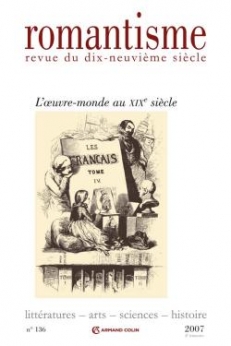
Romantisme n° 136 (2/2007)
Pour acheter ce numéro, contactez-nous
Recevez les numéros de l'année en cours et accédez à l'intégralité des articles en ligne.
Mis bout à bout, La Comédie humaine, Les Rougon-Macquart et À la recherche du temps perdu sont désormais perçus comme un continu donnant à connaître un état de la société française pendant un bon siècle. Entre ces trois oeuvres, il est maints échanges de procédés « techniques » qui révèlent un même souci de tout dire d’un monde social, tantôt en recourant à des structures très agencées, tantôt en s’abandonnant davantage à un « écrire sans fin » éperdu et quelque peu anarchique. Par ailleurs, les trois ensembles partagent des éléments de tonalité, particulièrement significatifs d’une appréhension contradictoire du monde social et de sa représentation. Tandis que Balzac, Zola et Proust placent leurs romans sous le signe d’une fatalité malfaisante, ils manifestent une manière d’euphorie dans l’évocation des déterminismes qui pèsent sur les personnages en ce que ces déterminismes s’expriment tantôt en reproduction trop prévisible et tantôt en inversion ironique du sort.
Put end to end, La Comédie humaine, Les Rougon-Macquart and À la recherche du temps perdu from now on are perceived like a continuum unveiling a state of the French society during a good century. Between these three works, many exchanges of “technical” processes can be seen which reveal the same concern of telling everything about a social world, sometimes while resorting to very arranged structures, sometimes while more giving way to a passionate and somewhat anarchic “writing without end”. Moreover, the three sets share elements of tonality, particularly significant of a contradictory apprehension of the social world and its representation. While Balzac, Zola and Proust place their novels under the sign of a harmful fate, they express a manner of euphoria in the evocation of the determinisms which weigh on the characters in the sense that these determinisms are sometimes expressed in a too foreseeable reproduction and sometimes in an ironic inversion of the fate.

